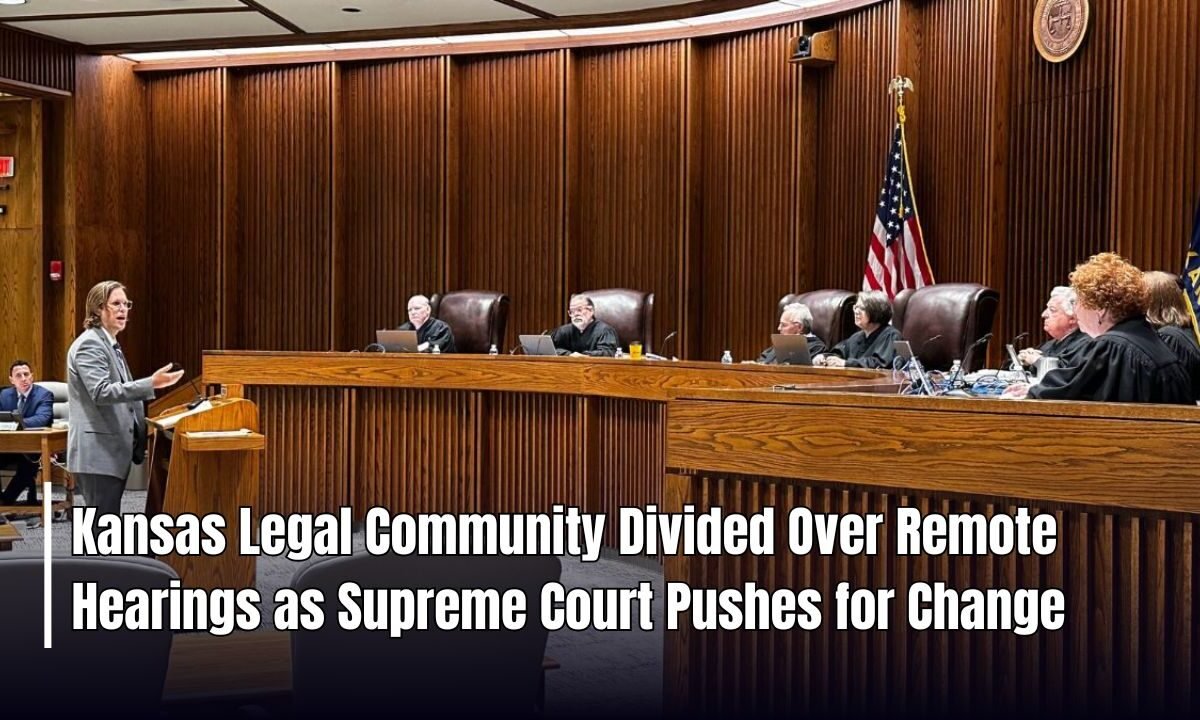In Topeka, Kansas Legal Services now depends on remote court appearances in 22 counties in the state’s southwestern region after losing its only local attorney in that area in August, explained Matthew Keenan, executive director of Kansas Legal Services.
Yet, judicial attitudes toward virtual proceedings differ: some judges reject them outright, while others make them a default option.
To reduce that inconsistency, the Kansas Supreme Court has proposed a new rule to standardize when and how courts may permit remote appearances. The objective is to boost efficiency and broaden access to criminal justice.
Although this rule is not yet in force, it has elicited mixed responses from judges and lawyers via interviews and public comments submitted to the Court (data obtained by Kansas Reflector).
Keenan warned in an August 1 statement that “Kansas stands at a crossroads,” adding that “equal justice under law cannot be fulfilled” if courts maintain a fragmented, discretionary approach to remote access, especially since technology offers better options.
While he sees the proposal as a chance to improve access to justice, several judges hold a more skeptical view.
Divergent Views from the Bench
Chief Judge Clinton Peterson of the 26th Judicial District (southwest Kansas) criticized remote appearances in a public comment submitted August 29. He argued that:
- Court interactions lose depth when participants “appear on the computer.”
- Litigants become more disrespectful, attorneys less professional.
- Remote hearings make judges appear “foolish and stupid.”
Still, Keenan affirmed that in-person hearings remain the ideal. Yet he argues that a clear, enforceable rule presuming remote appearances could modernize the judicial system while aligning with constitutional, public, and practical demands—especially in rural and underserved regions.
Keenan cited several judges in rural counties who resist remote hearings, typically where there are limited attorneys to represent low-income defendants. He clarified that shifting toward default remote proceedings is not radical but pragmatic, given attorney shortages and the decline of legal representation in rural Kansas.
Balancing Judicial Discretion and Equal Access
Key Provisions of the Proposed Rule
The draft rule aims to preserve judicial discretion but also prioritize equal access to justice. Key elements include:
- A district court would authorize remote proceedings or appearances (when appropriate) to enhance efficiency and access.
- Judges may deny a request if it is untimely or if a remote format would undermine fairness, integrity, or effectiveness—for instance, during dense or highly evidentiary testimony.
- Remote requests should be considered especially when:
- All parties agree
- The hearing pertains to preliminary or scheduling matters
- Travel burden outweighs benefits
- Remote format eases access or helps offset attorney shortages
- A party has health concerns about in-person attendance
Concerns from Defense Attorneys
A group of attorneys from Wichita (Dan Monnat, Eli O’Brien, Braxton Eck) cautioned that the proposal lacks regard for the defendant’s right to be present in their own prosecution.
They urged the Supreme Court to incorporate a requirement that remote hearings not proceed if the defendant objects.
They emphasized that even a seemingly innocuous scheduling conference can escalate into a high-stakes hearing. Thus, they argue, a defendant must have the opportunity to be physically present during every stage.
Judicial Reservations About Rule Language
Chief Judge Bruce Gatterman (24th Judicial District) supports remote hearings in his rural, multi-county district, especially for procedural or emergency matters.
Yet he cautions that the proposed rule intrudes on judicial discretion. He suggests removing the list of illustrative reasons (for or against remote proceedings) and leaving decisions more open.
Other judges have suggested that the rule’s wording avoid prescribing mandatory virtual hearings. Van Hampton, a lawyer from Dodge City, even urged the Court to make virtual hearings mandatory, naming judges who currently block remote appearances.
He criticized requiring attorneys from outside the district to travel long distances for brief hearings as punitive to out-of-town counsel.
Limitations and Challenges of Remote Proceedings
While the rule is largely seen as a “common-sense” attempt to adapt to realities in rural Kansas, Ann Sagan, new executive director of Kansas’ Indigents’ Defense Services, warned it is not a panacea.
- Their agency already pays attorneys from urban areas to travel hundreds of miles to represent rural defendants.
- The rule could help mitigate, but cannot resolve, the deeper shortage of rural attorneys.
- She emphasized that remote hearings must be implemented in ways that protect constitutional rights and maintain public access to courts.
Origin of the Rule and Institutional Context
In 2022, the Kansas Supreme Court formed a Rural Justice Initiative Committee to examine the attorney shortage, which some justices deemed a constitutional crisis.
The committee assessed remote hearings among other solutions but did not land on a definitive recommendation. In its 2024 final report, it noted that:
- Some members supported mandating remote hearings in rural counties
- Others cautioned this might conflict with the goal of attracting attorneys to live and practice in rural Kansas
The proposed rule was released in July, and public comments were accepted through August. Lisa Taylor, Director of Public Information for Kansas’ Office of Judicial Administration, explained that the Court is now reviewing the submissions. Possible next steps include:
- Adopting the rule as drafted
- Approving it with modifications
- Reopening it for further public comment
- Or declining to act altogether
Kansas is at a pivotal moment in managing access to justice across its rural counties. The proposed rule on remote court appearances aims to bring clarity and consistency to courtroom practices, especially in areas suffering from attorney shortages.
While it offers promise in improving efficiency and broadening access, it also raises significant concerns about preserving judicial discretion and protecting a defendant’s rights.
Whether the Kansas Supreme Court will adopt, amend, or shelve the proposal, the decision will profoundly influence how justice is delivered across the state’s vast rural landscape.




